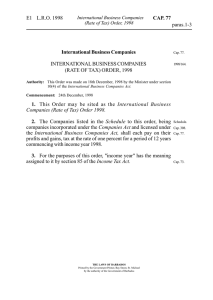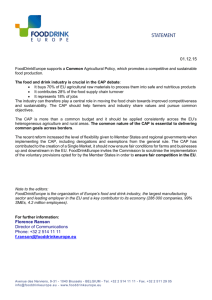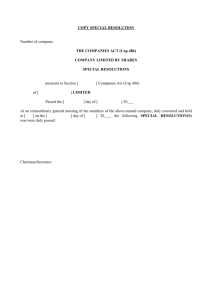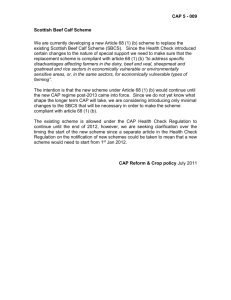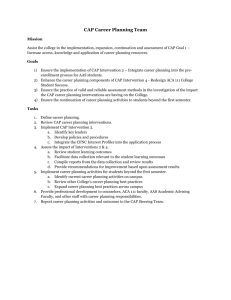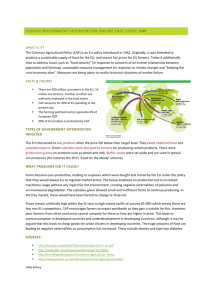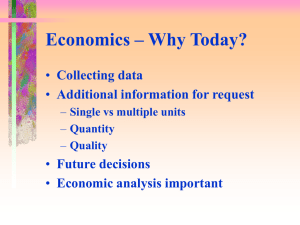LACC Meeting Minutes March 7, 2014 378 Rod Library
advertisement
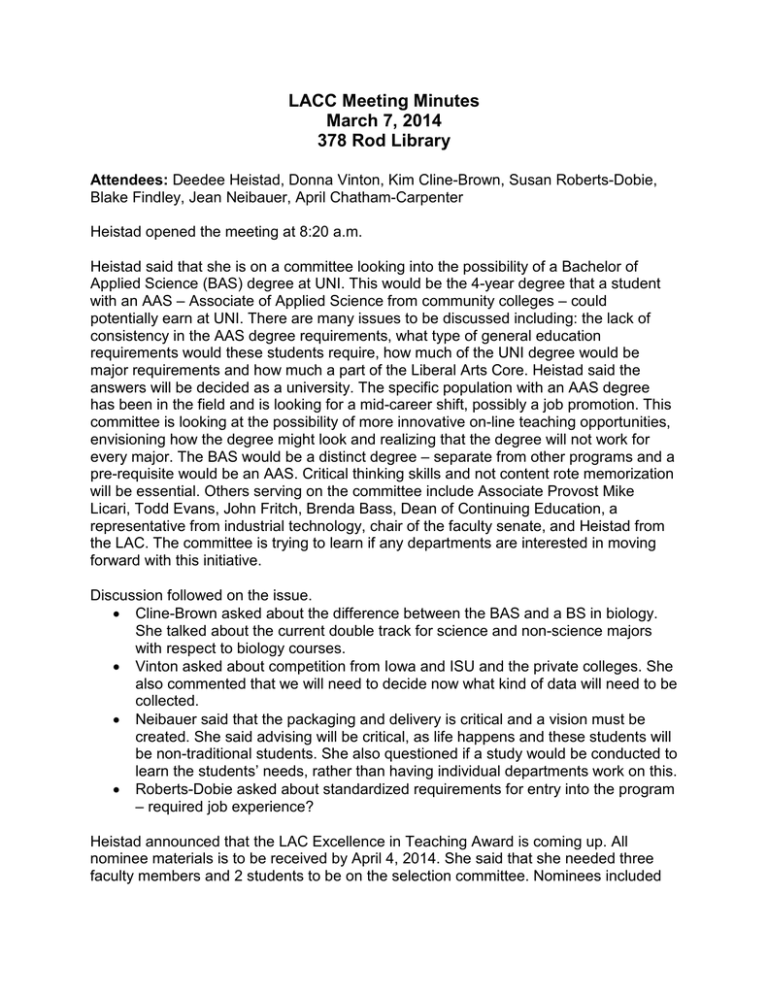
LACC Meeting Minutes March 7, 2014 378 Rod Library Attendees: Deedee Heistad, Donna Vinton, Kim Cline-Brown, Susan Roberts-Dobie, Blake Findley, Jean Neibauer, April Chatham-Carpenter Heistad opened the meeting at 8:20 a.m. Heistad said that she is on a committee looking into the possibility of a Bachelor of Applied Science (BAS) degree at UNI. This would be the 4-year degree that a student with an AAS – Associate of Applied Science from community colleges – could potentially earn at UNI. There are many issues to be discussed including: the lack of consistency in the AAS degree requirements, what type of general education requirements would these students require, how much of the UNI degree would be major requirements and how much a part of the Liberal Arts Core. Heistad said the answers will be decided as a university. The specific population with an AAS degree has been in the field and is looking for a mid-career shift, possibly a job promotion. This committee is looking at the possibility of more innovative on-line teaching opportunities, envisioning how the degree might look and realizing that the degree will not work for every major. The BAS would be a distinct degree – separate from other programs and a pre-requisite would be an AAS. Critical thinking skills and not content rote memorization will be essential. Others serving on the committee include Associate Provost Mike Licari, Todd Evans, John Fritch, Brenda Bass, Dean of Continuing Education, a representative from industrial technology, chair of the faculty senate, and Heistad from the LAC. The committee is trying to learn if any departments are interested in moving forward with this initiative. Discussion followed on the issue. • Cline-Brown asked about the difference between the BAS and a BS in biology. She talked about the current double track for science and non-science majors with respect to biology courses. • Vinton asked about competition from Iowa and ISU and the private colleges. She also commented that we will need to decide now what kind of data will need to be collected. • Neibauer said that the packaging and delivery is critical and a vision must be created. She said advising will be critical, as life happens and these students will be non-traditional students. She also questioned if a study would be conducted to learn the students’ needs, rather than having individual departments work on this. • Roberts-Dobie asked about standardized requirements for entry into the program – required job experience? Heistad announced that the LAC Excellence in Teaching Award is coming up. All nominee materials is to be received by April 4, 2014. She said that she needed three faculty members and 2 students to be on the selection committee. Nominees included Blake Findley and Tori Hurst, as the students, and April Chatham-Carpenter, Kim ClineBrown, and Mike Klassen as the faculty members to serve on the selection committee. The nominees’ support materials will be available in both hard copy (at the LAC reception desk, 382 LIB) and electronically on an elearning site. Heistad passed out a draft copy of Category 1A: Reading & Writing advising handout. Sheets are being prepared for all categories. Heistad and Neibauer intend to have the advising sheets ready for New Student Orientation. Heistad passed out the 2014 Liberal Arts Core (total 45 hours) course listing. The only new item is the CS 1025 title change to Modern Tools for Exploring Data. Regarding the newly reorganized Category 5 – students coming in before 2014 can choose to complete the Category 5 requirements either the old way or the new way. Student entering UNI in fall 2014 students will be held to the new program. Heistad also noted that the experimental Capstone 3159 no longer being offered will not be included on the Capstone list. Other capstone courses listed are the courses that have been approved through the curriculum process. Heistad asked about the creation of a Capstone Coordinating Committee to think about assessment in Capstone courses and review course content, academic rigor, etc. She walked the committee through the summer capstone and the capstone courses coreferenced with Study Abroad. She said that most courses use the standard ETS program description which does not detail what is actually happening in the specific course. According to student comments, these programs are awesome, but it is not clear if academic rigor is in place. Heistad would like to have as much of a connection between capstone and the LACC as possible. Roberts-Dobie said she would be happy to be on the committee. Heistad said that since Gute is teaching a capstone course, she would also like him to be on the committee. Neibauer suggested appointing Yana Cornish, Study Abroad Director, on the committee. Heistad said the committee needs to be faculty driven and whenever Heistad has called Cornish regarding academic content of the courses, Cornish always refers Heistad back to the individual faculty member teaching the course. Heistad asked the committee what type of work, what type of projects the committee wants to pursue/invest in outside of curriculum issues. Discussion followed and suggestions were: • Chatham-Carpenter suggested the committee bring in Susan Hill, Director of the Center for Excellence in Teaching and Learning to talk about faculty development for the liberal arts core teaching and tiering the liberal arts core – creating recommendation for when students should take their LAC courses. Chatham-Carpenter said the committee needs to not just manage, but to actually vision the LAC. • Chatham-Carpenter said that Jerry Smith, Faculty Senate, Chair, gave a charge to the university writing committee to come up with a way of having additional • • • • • • • • • • • • writing requirements that build on the LAC. She thinks the LACC should ask to be a part of this conversation. Heistad said she has talked to David Grant about asking the writing committee to come to this committee to talk about writing. Findley said he would like to see more education for students on the importance of the LAC. Heistad said that she would actually like to talk to the students and the offices of NISG. She is going to work with Findley to make this happen. Vinton would like to see the LACC to dapple in the skills that go across the category – cohesiveness – for students to see that these skills transfer out into their lives – work toward some goals—university goals for an undergraduate degree. Neibauer said that perhaps the LACC can champion faculty development in the teaching of the LAC courses and co-host with the CETL to have discussions on the needs of the faculty teaching LAC courses. Chatham-Carpenter would like to see break-out sessions at the fall faculty workshop that address the needs of the LAC, i.e. teaching the humanities, teaching first-year students. She suggested that by doing these during the fall faculty workshop it would make it easier for faculty to get to the workshops. Chatham-Carpenter would like to see every 5-years a 2-day workshop offered to faculty. Chatham-Carpenter suggested the LACC sponsor a drive-in workshop and invite our sister institutions and the community colleges. Roberts-Dobie would like to see more work towards supporting the adjunct instructors. Heistad agreed that this needs to increase. Currently adjuncts participate in the LAC by serving on coordinating committees. There are also a number of faculty who teach Cornerstone which also provides some community for adjuncts. Adjuncts have won the LAC Excellence in Teaching Award in the past. Vinton said the committee should put together a mission statement for the LACC. Heistad said the committee could use all of these ideas to set the agenda for the next academic year. She said she wants to improve communication with the faculty about these issues. Neibauer said the committee needs to promote the vision of the Liberal Arts Core. Findley announced that he might stay on the LACC for another year. Heistad asked if it would be appropriate to take advantage of this opportunity to have 2 students serve on the LAC and then somehow stagger their appointments in order to have a more permanent presence. Meeting adjourned at 9:43 a.m. Respectfully submitted, Susan Jordan Following are the handouts distributed during the meeting. 2014 LIBERAL ARTS CORE (Total 45 hours) (FOR ALL NEW FRESHMEN ENTERING UNI SUMMER 2014 AND THEREAFTER)(Any student who has completed Category 5 coursework at another institution prior to summer 2014 may opt to follow the previous LAC 2004 program.) Category 1. Core Competencies 12 hours A. Reading and Writing (3 hours required) Select one of the following: UNIV 1000* First-Year Cornerstone: Integrated Communication I, 3 hours & UNIV 1010* First-Year Cornerstone: Integrated Communication II, 3 hours *(Both UNIV 1000 and UNIV 1010 must be taken to meet LAC Category 1A & 1B.) UNIV 1059* First Year Cornerstone, 3 hours *This course will be taught in 2-semester increments and a student must complete both semesters or will not apply to LAC 1A and 1B credit. ENGLISH 1005 (620:005) College Writing and Research, 3 hours ENGLISH 2015 (620:015) Craft of Academic Writing, 3 hours ENGLISH 2120 (620:034) Critical Writing About Literature, 3 hours B. Speaking and Listening (3 hours required) UNIV 1000* First-Year Cornerstone: Integrated Communication I, 3 hours & UNIV 1010* First-Year Cornerstone: Integrated Communication II, 3 hours *(Both UNIV 1000 and UNIV 1010 must be taken to meet LAC Category 1A & 1B.) UNIV 1059* First Year Cornerstone, 3 hours *This course will be taught in 2-semester increments and a student must complete both semesters or will not apply to LAC 1A and 1B credit. OR COMM 1000 (48C:001) Oral Communication, 3 hours OR two courses distributed as follows: COMM 2256 (48C:011) Oral Interpretation: Texts in Performance, 3 hours or COMM 2255 (48C:071) Public Speaking, 3 hours or COMM 2257 (48C:074) Argumentation and Debate, 3 hours; AND COMM 2344 (48C:004) Interpersonal Communication, 3 hours or COMM 1205 (48C:031) Group Communication Skills, 3 hours C. Quantitative Techniques and Understanding (3 hours required)* MATH 1100 (800:023) Mathematics in Decision Making, 3 hours MATH 1420 (800:060) Calculus I, 4 hours STAT 1774 (800:064) Introductory Statistics for Life Sciences, 3 hours STAT 1772 (800:072) Introduction to Statistical Methods, 3 hours CS 1025 (810:025) Modern Tools for Exploring Data, 3 hours *Elementary Education students may meet the category 1C requirement by completing MATH 1204 (800:031). D. Personal Wellness (3 hours required) HPELS 1010 (440:010) Personal Wellness, 3 hours Or HPELS 1059 Dimensions of Well Being, 2 hours (including Dimensions of Well-Being Lecture/Discussion, 1 hour AND Dimensions of Well-Being Lab, 1 hour, as designated in Schedule of Classes) Category 2. Civilizations and Cultures 9 hours A. Humanities (6 hours required) HUM 1021 (680:021) Humanities I: The Ancient, Classical, and Medieval Worlds, 3 hours HUM 1022 (680:022) Humanities II: The Renaissance, Reformation, and Enlightenment, 3 hours HUM 1023 (680:023) Humanities III: The Age of Revolution to the Present, 3 hours B. Non-Western Cultures (3 hours required) ANTH 3159 HUM 3121 (680:121) HUM 3122 (680:122) HUM 3123 (680:123) HUM 3124 (680:124) HUM 3125 (680:125) HUM 3127 (680:127) HUM 3128 (680:128) Cultural Anthropology of Korea, 3 hours (no longer being offered) Russia/Soviet Union, 3 hours Japan, 3 hours Latin America, 3 hours China, 3 hours India, 3 hours Middle East, 3 hours Africa, 3 hours HUM 3132 (680:132)/ANTH 3132 (990:132) Native North America, 3 hours HUM 3137 (680:137)/ANTH 3137 (990:137) Native Central and South America, 3 hours *SPAN 3020 (780:120) may substitute for the non-Western Cultures requirement, 3hours Category 3. Fine Arts, Literature, Philosophy and Religion 6 hours A. Fine Arts (3 hours required)* PEMES 2034 (420:034) Survey of Dance History, 3 hours THEATRE 1002 (490:002) The Theatrical Arts and Society, 3 hours MUSIC 1100 (520:010) Soundscapes: Music in Culture, 3 hours ART 1002 (600:002) Visual Inventions, 3 hours ARTHIST 1004 (600:004) Visual Perceptions, 3 hours *MUS HIST 1020 (590:002) may substitute for the Fine Arts requirement for all music majors, 3 hours B. Literature, Philosophy, or Religion (3 hours required) ENGLISH 1120 (620:031) Literature: (topic), 3 hours RELS 1020 (640:024) Religions of the World, 3 hours PHIL 1020 (650:021) Philosophy: The Art of Thinking, 3 hours FREN 1120 (720:031) Introduction to Francophone Literature in Translation, 3 GER 1120 (740:031) Introduction to German Literature in Translation, 3 hours SLAV 1120 (770:031) Introduction to Russian Literature in Translation, 3 hours hours PORT 1031 (790:031) Introduction to Portuguese and Hispanic Literatures in Translation, 3 hours Category 4. Natural Science and Technology 7 hours Students are required to take a course with a scheduled laboratory from either Life Sciences or Physical Sciences or another laboratory course offered by the College of Humanities, Arts and Sciences. (Only 6 hours are required for students who meet the liberal arts core laboratory requirement with a course other than one listed in Life or Physical Sciences.) For all courses listed under Life Sciences and Physical Sciences, with the exception of ANTH 1001 (990:010), a student must have satisfied University entrance requirements in English and Mathematics. A. Life Sciences (3 or 4 hours required) SCI ED 1200 (820:032)* Inquiry into Life Science, 4 hours BIOL 1012 (840:012) Life: The Natural World, 3 hours BIOL 1013 (840:013)* Life: The Natural World - Lab, 1 hour BIOL 1014 (840:014) Life: Continuity and Change, 3 hours BIOL 1015 (840:015)* Life: Continuing and Change - Lab, 1 hour BIOL 1033 (840:033)* Principles of Microbiology, 3 hours BIOL 2051 (840:051)* General Biology: Organismal Diversity, 4 hours BIOL 2052 (840:052)* General Biology: Cell Structure and Function, 4 hours BIOL 3101 (840:101)* Anatomy and Physiology I, 4 hours ANTH 1001 (990:010) Human Origins, 3 hours *Lab course B. Physical Sciences (3 or 4 hours required) CHEM 1010 (860:010)* CHEM 1011 (860:011) Molecules and Life, 3 hours CHEM 1020 (860:020)* Chemical Technology, 4 hours CHEM 1110 (860:044)* General Chemistry, 4 hours CHEM 1030 (860:061)* Applied General Chemistry, 4 hours CHEM 1130 (860:070)* General Chemistry I-II, 5 hours EARTHSCI 1100 (870:010)** Astronomy, 3-4 hours EARTHSCI 1110 (870:011)* Astronomy Laboratory, 1 hour EARTHSCI 1200 (870:021) Elements of Weather, 3 hours EARTHSCI 1210 (870:022)* Elements of Weather, Laboratory, 1 hour EARTHSCI 1300 (870:031)* Introduction to Geology, 4 hours EARTHSCI 3328 (870:125)* Fossils and Evolution, 4 hours GEOG 1210 (970:026) Physical Geography, 3 hours GEOG 1211 Physical Geography Laboratory, 1 hour PHYSICS 1400 (880:011)* Conceptual Physics, 4 hours PHYSICS 1000 (880:012) Physics in Everyday Life, 3 hours PHYSICS 1511 (880:054)* General Physics, 4 hours PHYSICS 1701 (880;130)* Physics I for Science and Engineering, 4 hours SCI ED 1300 (820:031)* Inquiry into Physical Science, 4 hours SCI ED 1100 (820:033)* Inquiry into Earth Science, 4 hours TECH 1015 Introduction to Sustainability, 3 hours * Lab Course ** Lab Course if 4-hour option elected Principles of Chemistry, 4 hours Category 5. Social Science 9 hours Required: one course from group A, one course from group B, and one course from group A, B, or C. (Students cannot count both GEOG 1120 [970:010] and GEOG 1110 [970:040] toward the liberal arts core.) A. Group A Sociocultural and Historical Perspectives ANTH 1002 (990:011) Culture, Nature, and Society, 3 hours GEOG 1120 (970:010) Human Geography, 3 hours GEOG 1110 (970:040) World Geography, 3 hours (moved to Group C) HISUS 1023 (900:023) History of the United States, 3 hours SOC 1000 (980:001) Introduction to Sociology, 3 hours WGS 1040 (680:040) Women’s and Gender Studies: Introduction, 3 hours B. Group B Individual and Institutional Perspectives ECON 1031 (920:024)* Introduction to Economics, 3 hours FAM SERV 1010 (31F:010) Human Identity and Relationships, 3 hours POL AMER 1014 (942:014) Introduction to American Politics, 3 hours PSYCH 1001 (400:001) Introduction to Psychology, 3 hours POL INTL 1024 (943:024) International Relations, 3 hours (moved to Group C) *Satisfactory completion of both ECON 1041 (920:053) and ECON 1051 (920:054) by all non-business majors and Business Teaching majors, through UNI or transfer, may substitute for ECON 1031 (920:024). C. Group C Topical Perspectives Diversity and Global Issues EDPSYCH 2030 (200:030) Dynamics of Human Development, 3 hours GEOG 1110 (970:040) World Geography, 3 hours (moved from Group A to Group C) POL GEN 1020 (940:020) Contemporary Political Problems, 3 hours POL INTL 1024 (943:024) International Relations, 3 hours (moved from Group A to Group C) SOC 1060 (980:060) Social Problems, 3 hours SOC SCI 1020 (900:020) Women, Men, and Society, 3 hours SW 1041 (450:041)/SOC SCI 1041 (900:041) Social Welfare: A World View, 3 hours SW 2045 (450:045)/SOC SCI 1045 (900:045)/SOC 1045 (980:045) American Racial & Ethnic Minorities, 3 hours Category 6. Capstone Experience 2 hours CAP 3102 (CAP:102)/TECH 3102 (330:102) Living in our Techno-Social World, 3 hrs. CAP 3103 (CAP:103) Multidisciplinary Perspectives on Genocide: Case Studies, 3 hrs. CAP 3105 (CAP:105) Sacred Space, 3 hours CAP 3106 (CAP:106)/THEATRE 3100 (490:106) Theatre in Education, 3 hours CAP 3110 (CAP:110)/BIOL 3110 (840:110) Obesity and Diabetes: Science, Sociology and Economics, 2 hrs. CAP 3121 (CAP:121) Creativity and the Evolution of Culture, 3 hrs. CAP 3122 (CAP:122) Building Communities: Developing Intentional Family Spaces, 3 hrs. CAP 3123 (CAP:123) Greece: From the “Cradle of Democracy” to Today, 3 hrs. CAP 3124 (CAP: 124) Democracies, 3 hrs. CAP 3125 (CAP: 125) Globalization, Cultural Pluralism, and International Society, 3 hrs. CAP 3128 (CAP:128)/COMM 4236 (48C:128) Ethics in Communication, 3 hrs. CAP 3129 (CAP:129) Being National, 3 hrs. CAP 3130 (CAP:130) Science and Pseudoscience: Critiquing the World Around You, 3 hrs. CAP 3131 (CAP:131) Analysis of Social Issues, 3 hrs. CAP 3132 (CAP:132) Medicine, Morality, and Society, 3 hrs. CAP 3134 (CAP:134) Back in the Valley: Martin Luther King Jr. and the 21st Century, 3 hrs. CAP 3140 (CAP:140) Environment, Technology, and Society, 2 hrs. CAP 3144/ENGLISH 3144 Genocide in Writing and Film, 3 hrs. CAP 3123 (CAP:123) Greece: From the “Cradle of Democracy” to Today, 3 hours CAP 3124 (CAP:124) Democracies, 3 hours CAP 3125 (CAP:125) Globalization, Cultural Pluralism, and International Security, 3 hours CAP 3128 (CAP:128)/COMM 4236 (48C:128) Ethics in Communication, 3 hours CAP 3129 (CAP:129) Being National, 3 hours CAP 3130 (CAP:130) Science and Pseudoscience: Critiquing the World Around You, 3 hrs. CAP 3131 (CAP:131) Analysis of Social Issues, 3 hours CAP 3132 (CAP:132) Medicine, Morality, and Society, 3 hours CAP 3134 (CAP:134) Back in the Valley: Martin Luther King Jr. and the 21st Century, 3 hours CAP 3140 (CAP:140) Environment, Technology, and Society, 2 hours CAP 3144/ENGLISH 3144 Genocide in Writing and Film, 3 hours CAP 3148 (CAP:148)/ENGLISH 3148 GER 3048 (740:148) The Holocaust in Literature and Film, 3 hours CAP 3151 (CAP:151)/PHIL 3010 (650:151) Money, Sex & Power: Theories of Race, Class, & Gender, 3 hours CAP 3152 (CAP:152)/HPE 3650 (410:152) Complementary, Alternative and Integrative Health, 3 hours CAP 3154/BUSINESS 3154 Global Skills, 2-3 hours CAP 3155 (CAP:155)/BUSINESS 3155 (100:155) Socio-Economic Reality of Central America, 2 hours CAP 3158 (CAP:158) The Water Planet, 3 hours CAP 3159/BUSINESS 3159 Managing Energy and Sustainability for the Organization, 3 hours (eff. Spring 2014) CAP 3159/RELS 3159/PHIL 3159 Monsters, Vampires, and Religion: An Awesome Alliance CAP 3159 (CAP:159) Child, Family, and Community Development in Nicaragua, 3 hours (no longer being offered) CAP 3159 (CAP:159) Communication Disorders and Society, 3 hours (no longer being offered) CAP 3159 (CAP:159) Conflict Transformation in Northern Ireland, 3 hours (remove per D. Heistad – might not be offered for awhile through Study Abroad) CAP 3159 (CAP:159) course # eff Sumr 14) Constructing Cross-Cultural Bridges, 3 hours (permanent CAP 3159 (CAP:159) Evolution in the Courtroom, on the Stage, 3 hours (no longer being offered) CAP 3159 (CAP:159) Genocide in Writing and Film, 3 hours (permanent course # eff Sumr 14) CAP 3159 (CAP:159) Ghanaian Culture Immersion, 2 hours (no longer offered) CAP 3159 (CAP:159)/TESOL 3186 (630:186)/LANG 3186 (700:186) Intercultural Perspectives, 3 hours (permanent course # eff 12-14 catalog) CAP 3159 (CAP:159) Lies and Lying in Personal and Public Life, 3 hours (no longer offered) CAP 3159/ENGLISH 3186 Myths of Ireland hours CAP 3159 (CAP:159) The Black Sea: Exploring Crimea, 2 hours (remove per D. Heistad – might not be offered for awhile through Study Abroad) CAP 3159 (CAP:159) The Idea of a University, 3 hours (permanent course # eff Sumr 14) CAP 3159 (CAP:159) Russia Today, 3 hours (remove per D. Heistad – might not be offered for awhile through Study Abroad) CAP 3160 (CAP:160)/HPE 3160 (410:160) Community and Public Health, 3 hours CAP 3165/GER 3334/TESOL 3565 Intercultural Perspectives, 3 hours CAP 3173 (CAP:173)/RELS 3510 (640:173)/PHIL 3510 (650:173) CAP 3187 (CAP:187)/ENGLISH 4577 (620:187) Bio-Medical Ethics, 3 hours Blues and Jazz in African American Film and Literature, 3 hours CAP 3190 Idea of the University, 3 hours CAP 3194 (CAP:194)/RELS 3110 (640:194)/PHIL 3110 (650:194) Perspectives on Death and Dying, 3 hours CAP 3550/TESOL 3550 Constructing Cross-Cultural Bridges, 3 hours Diane Wallace 1/21/2014
